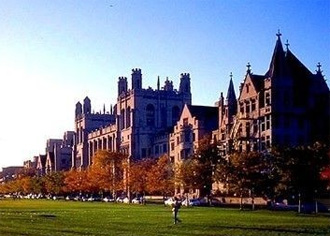Do you want to take time to stop andbreathe in this fast-paced and competitive world? If your answer is yes, youmay be interested in the “happiness course” at Harvard. The ^happiness course”or positive psychology is now the most popular course at Harvard in recentyears. It adds to the Harvard spirit a new luminescent spot, that is, to live ahappy life.
在這個(gè)節(jié)奏很快、競(jìng)爭(zhēng)很激烈的世界,你是否想停下來(lái)喘口氣呢?如果你的回答是肯定的,你也許會(huì)對(duì)哈佛的“幸福課”感興趣。“幸福課”,或積極心理學(xué),是哈佛近幾年最受歡迎的課。它給哈佛精神增添了一個(gè)新的亮點(diǎn),就是“幸福地生活”。

In his class,BenShahar does notteach his students how to become successful. Instead, he teaches how to behappy in a simple way. In his first lecture, only 8 students came and two leftmidway. Then 400 came to his second lecture, and 850 to the third. By now, atleast one fifth of Harvard College’s undergraduate populations of about 6,500are in this class.
在本-沙哈爾的課上,他會(huì)深入淺出地教學(xué)生如何幸福,而不是教學(xué)生如何成功。第一節(jié)課,只有8個(gè)學(xué)生來(lái)上課,還有兩個(gè)中途就走了。第二節(jié)有400名學(xué)生,第三節(jié)有850名學(xué)生。到現(xiàn)在,至少有1/5的哈佛本科生,也就是6500名學(xué)生選這門(mén)課。
It is an astonishing scene in thehard-driving academic atmosphere of Harvard. Most students see it as a braincandy. Ben argues that if the course seems easy, it is because it holds suchgreat relevance to students5 own lives. “Most things we find interesting, wealso find easy,” he said.
這在學(xué)術(shù)氣氛很濃的哈佛里面算是令人驚訝的一幕。很多學(xué)生覺(jué)得這門(mén)課很簡(jiǎn)單,像飯后甜點(diǎn)。本說(shuō)這門(mén)課簡(jiǎn)單是因?yàn)樗蛯W(xué)生的生活密切相關(guān)。他說(shuō),“很多我們認(rèn)為有意思的東西,也是我們覺(jué)得簡(jiǎn)單的東西。”
Indeed, being happy is closely related toeveryone’s life. People can put up with being poor, but few can bearunhappiness. Nowadays, in particular, people feel a lot of pressure, and manyfeel unhappy even if they are successful. At Harvard, many students havepsychological problems, such as severe anxiety, emotional disturbance, anddepression. This problem is not only nagging Harvard, but the whole United States.Compared to the 1960s, now people are richer and richer, but the frequency rateof depression is 10 times higher. The age of onset has dropped from 29.5 yearsold in the 1960s to 14.5 today. According to a research conducted by HarvardUniversity, 80% of Harvard students feel at least very dismayed and depressedonce each year, 47% feel too dejected to do anything, and 10% confess that theyhave thought about killing themselves.
確實(shí),幸福和每個(gè)人的生活緊密相連。人們可以忍受貧窮,但幾乎沒(méi)人可以受得了不幸福。尤其現(xiàn)在人們感到了很多壓力,很多人即使成功了也感到不幸福。在哈佛,很多學(xué)生都有心理問(wèn)題,比如過(guò)度焦慮、情緒紊亂、抑郁。這個(gè)問(wèn)題并不是僅僅困擾哈佛,也困擾了整個(gè)美國(guó)。和20世紀(jì)60年代相比,現(xiàn)在人們?cè)絹?lái)越富裕了,但抑郁癥的患病率卻髙出10倍,發(fā)病率也從20世紀(jì)60年代的29.5歲下降到今天的14.5歲。哈佛大學(xué)的一項(xiàng)調(diào)査研究顯示,每年有80%的學(xué)生至少有過(guò)一次感到非常沮喪、消沉;47%的學(xué)生感到因?yàn)樘趩识鵁o(wú)法正常做事;10%的學(xué)生稱(chēng)他們?cè)?jīng)考慮過(guò)自殺。
What causes this phenomenon? If you arelooking for answers, you can go to BenShahar5s class. He will teach you how tolead a better life. Here are some tips from Ben-Shahar: expressing gratitude;thinking about your family and friends; simplifying your life; learning to sayno to something; finding what you enjoy most and what you are good at; givingup perfectionism and learning to “fail to do something”.
是什么造成了這種現(xiàn)象?如果你在尋找答案,你可以去聽(tīng)聽(tīng)本-沙哈爾的課。他會(huì)教你如何更好生活。下面是本-沙哈爾給出的一些提示:表達(dá)感激:想想你的家人和朋友;簡(jiǎn)化生活;學(xué)會(huì)說(shuō)不;找到自己喜歡和擅長(zhǎng)的東西:放棄完美主義,“學(xué)會(huì)失敗”。












